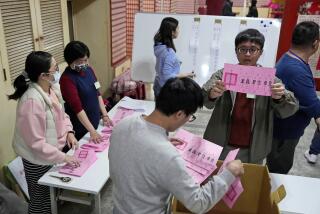Double Standards ‘Guide’ the Vote : Taiwan: The trappings of a democracy masked Kuomintang maneuverings, guaranteeing a win for the government party.
- Share via
In December, Taiwan conducted its first nationwide election. There were all the trappings of a democratic vote, the sort of thing you would expect the creators of Disneyland to make if they decided to “do” a real election. The polling booths looked right, there were plenty of noisy rallies, almost five hours of TV ads, firecrackers galore, street campaigning, posters, pundits, packs of journalists, international observers (I was one), vote-counting reported minute-by-minute, sportscaster style, by cute TV anchors. All the ballyhoo of a democratic election.
Unfortunately, much of it was just ballyhoo. Behind the scenes, the government party--Kuomintang (KMT)--controlled the Electoral Commission and prohibited publication of platforms supporting independence in the official gazettes or in TV ads, even though independence was supposed to be a critical issue. All that and a complex formula for allocating fictitious seats for the mainland effectively guaranteed a KMT victory. There was rampant vote-buying by government party candidates while the government, charged with enforcing the law, virtuously bemoaned the fact. This much-heralded national election for an assembly to revise the constitution was so loaded that opposition leaders announced beforehand that if they got 25%, it would be a victory. With numbers like those, it’s not hard to figure out how the amended constitution will look.
Taiwan is freer than it was five years ago, make no mistake about that, and it appears to be moving in the right direction. But it is still essentially an autocratic state with all critical power in the hands of the Kuomintang. The KMT, a political party modeled on Leninist principles, ruled mainland China as best it could until Mao Tse-tung overthrew it in 1949. Its remnants escaped to Taiwan, imposed themselves on the Taiwanese people and have ruled them ever since. It justifies keeping power in order to regain the mainland from the Communists and reunite the country.
If a dictator had tried to rig an election this way anywhere else, the world press would have skewered him. But there has been a strange double standard in the world’s appraisal of the election in Taiwan. Most of the media reported it as fair and democratic. (The most bizarre interpretation, an editorial in the New York Times, read the outcome as a “strong vote for one China.” Whatever the vote meant, that was the one thing the majority of voters, whether KMT or not, don’t want.) It is this persistent discrepancy between what the media reported and what happened that puzzles and depresses me more than anything else.
In the course of a week traveling through the island to observe the campaign and the balloting, several KMT officials compared achievement in Taiwan to China’s record. They told me that they had provided a degree of stability and prosperity in Taiwan that was unknown in 4,000 years of Chinese history. It’s true. Free-market Taiwan is one of the richest countries in the world. Across the straits, China, with its bizarre central planning, gross political repression and epic corruption, has produced a system that provides 1 billion people with lives about as nasty and brutish as you will find on this planet.
But what does that have to do with the free and fair elections of a democracy? More than meets the eye. What the KMT were saying to me is that when it comes to the Chinese, a special standard should be applied. With stability provided by a “firm” hand, Chinese people can make a lot of money and lead contented lives. The implication was that there’s something in Chinese character and culture that disables them from governing themselves democratically, and if you give them the chance, everyone will regret it.
So in this part of the world, we’ll have “guided” democracies and “guided” elections and the world will certify them as “free and fair.” Years ago, in Hong Kong, a British lawyer, gin and tonic in hand and speaking with nannyish authority, gave me the same sort of lecture.
The KMT has asked for a double standard, and an increasingly free world that should be denouncing it has accommodated. It’s not right. Double standards are loathsome. Democracy is a complex art and it may take time to learn it, but if Taiwan, with its literacy rate, its boom-ing private sector and its advanced industrial infrastructure still isn’t ready, who is?
The people in Taiwan are entitled to a genuinely free and fair election in which the supervising Electoral Commission is not controlled by the government party and does not censor the party platforms of the opposition and use the threat of sedition laws--so vague they would not pass constitutional muster in any real democracy--to chill open discussion of the critical issues in the election; in which businessmen who’d contribute to the opposition can do so without fear of economic reprisal or harassment; in which rampant vote-buying by the government party is prevented and punished.
And the Taiwanese people are also entitled to something from us. The same standard of democratic opportunity we insist on for everyone else in the world.
More to Read
Sign up for Essential California
The most important California stories and recommendations in your inbox every morning.
You may occasionally receive promotional content from the Los Angeles Times.













